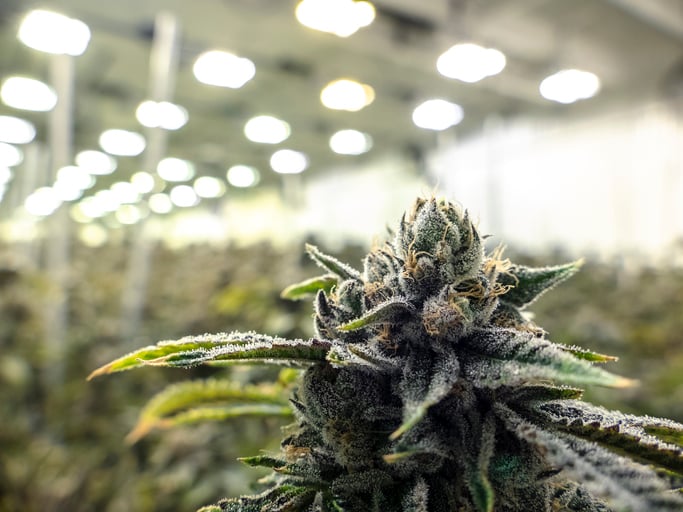Canopy Growth (CGC 0.81%) has plenty of competition. You'd have to put Aurora Cannabis (ACB +0.71%) high on the list, especially after the company captured 20% of Canada's recreational marijuana market in the last quarter.
Cronos Group (CRON +0.19%) is another key rival for Canopy Growth. When the big investment from tobacco giant Altria is completed, Cronos will have a lot more cash to use in competing against Canopy. There's also Tilray (TLRY +0.00%). For a while last year, Tilray and Canopy Growth were neck-and-neck in the battle for the largest market cap among marijuana stocks.
But none of these other Canadian marijuana producers rank as Canopy Growth's top rival. Who is the company's most serious challenger? A recent report from Statistics Canada gave the answer.
Check out the latest earnings call transcript for Canopy Growth.

Image source: Getty Images.
The biggest competitor
Statistics Canada is the national number-cruncher for the Canadian government. With the cannabis industry becoming more important to the Canadian economy, the agency provides updates about cannabis production and sales on a quarterly basis.
The latest report from Statistics Canada revealed that cannabis-related spending totaled $2.2 billion Canadian (around US$1.6 billion) in the fourth quarter. That figure represents 0.4% of Canada's gross domestic product in Q4.
Canopy Growth announced a few weeks ago that it made CA$83 million (roughly US$62 million) in the quarter ending Dec. 31. The company said CA$57.7 million (around US$43.4 million) stemmed from the adult-use recreational marijuana market. Aurora Cannabis reported that it made CA$21.6 million (close to US$16 million) in the same quarter in recreational pot sales, with total revenue of CA$54.2 million (US$40.7 million).
Neither Cronos Group nor Tilray has posted results for last quarter yet. But in terms of production capacity, Canopy and Aurora stand well ahead of the other Canadian marijuana producers. It's a virtual certainty that Cronos and Tilray will report lower recreational marijuana sales than either Aurora or Canopy Growth.
Who is the mystery rival that's commanding a much greater market share than even Canopy Growth? The black market. Statistics Canada stated that illegal cannabis sales in Q4 totaled CA$1.4 billion (around US$1 billion) compared to CA$770 million (close to US$573 million) in legal cannabis sales.
Closing the gap
Significant levels of illegal marijuana sales were expected. The Bank of Novia Scotia estimates that 71% of total marijuana sales in Canada in 2019 will be on the black market. Statistics Canada's Q4 figures were in line with that projection.
However, look for Canopy Growth and its peers to close the gap considerably in the future. By 2020, the Bank of Nova Scotia thinks the black market will generate only 37% of total marijuana sales.
There are several reasons Canopy, Aurora, Cronos, Tilray, and other licensed marijuana producers will take sales away from the black market in the future. For one thing, there was a timing issue at play in Q4. The adult-use recreational pot market in Canada didn't open until Oct. 17, nearly three weeks into the fourth quarter.
A bigger factor, though, is that the production capacity for the major marijuana growers will increase in 2019 and into 2020. The single most important reason marijuana sales on the black market dwarfed legal marijuana sales in Q4 was that there wasn't enough legal pot available to meet the demand.
Another way Canopy Growth and its peers will take market share away from illegal sellers is by beefing up their retail operations in Canadian provinces. This process will extend beyond 2019, but you can probably expect to see an increasing ramp-up in recreational pot sales from retail outlets throughout this year.
A persistent rival
Don't think Canopy Growth's biggest "rival" will give up its market share without a fight. Colorado's legal recreational pot market opened in 2014. Since then, the black market has boomed.
There are a couple of significant advantages that illegal marijuana sellers have over companies like Canopy, Aurora, Cronos, and Tilray. First, they don't have to pay any taxes. Second, they don't have to comply with regulatory requirements such as packaging and quality-control standards. As a result, marijuana prices on the black market can be well below legal prices.
The problem for investors is that the valuations for the top marijuana stocks hinge on expectations of tremendous growth. These growth levels won't be achieved if sales of pot on the black market are too high.
Maybe one day either Aurora Cannabis, Cronos Group, or Tilray will become the top rival for Canopy Growth. If that happens, it will probably be good news for all marijuana stocks.








